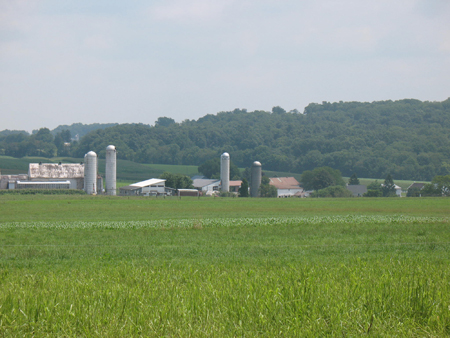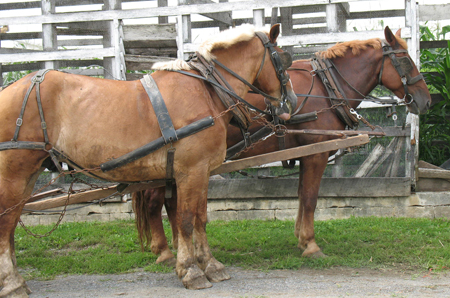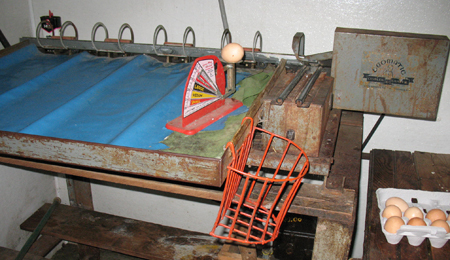Pleasant Pastures is a 67 acre Amish organic farm in Honeybrook, PA. In attendance this past Saturday were 4 interns and 3 general public from the Philadelphia area. Benuel and Anna Stoltzfus and their nine children work this idyllic farm in western Chester County, raising grass fed beef and Jersey milk cows, free range chickens, pigs, rabbits and one sheep for weed control. They also grow fruits and vegetables, mostly for home use. Ben employs 3 part-time helpers in addition to his family's contributions.
Bought by Ben's dad in 1983, the farm was originally conventional and used pesticides and chemical fertilizers. By the early 1990's the Stoltzfus's had switched to organic methods, realizing that even with chemicals and herbicides they weren't getting enough weed control. By chance, Ben had discovered his back fields that had escaped the sprays, actually had less weeds through cultivation, than the near fields receiving the spraying. Full transition to all organic practices occurred soon afterwards.
At the beginning of our workshop, we discussed milk prices and marketing, since Ben has been producing and shipping raw organic milk for sale since 2000. He suggests that pricing for farmers is even lower now than in the 1960's. Farmers get $1.05 per gallon of conventional milk, which simply can't cover their costs. Many small dairy farms are predicted to close down this winter because of the failure to achieve higher pricing. Ben said that in the mid 1980's the price was up to $14/hundred lbs but that imports and politics have affected current pricing, which has dropped to $11/hundred lbs.
According to Ben, the PA Milk Board does not have a clear floor on pricing. I found an interesting historical forecast at this 2006 Cornell article. Another more recent link to information on the drop in prices can be found here. The Farm to Consumer Legal Defense Fund suggests there is a glut of dairies producing organic milk and that the demand has dropped with the current recession. And you may be interested in reviewing thesecommentaries about the issues on NODPA (Northeast Organic Dairy Producers Alliance).
An excerpt from Francis Thicke's comments about the pricing mechanics in the dairy sector:
"During recent years, the dairy marketplace has become increasingly concentrated, to the point that monopoly power now appears to play a role in setting dairy prices. Economic literature indicates that if four (or fewer) firms control 40% of a market, that market no longer functions as a competitive market. Today, just one firm purchases 34% of the milk produced by U.S. dairy farmers. That firm, Dairy Farmers of America (DFA), also has marketing agreements with other dairy purchasers, leading industry analysts to estimate that DFA by itself indirectly controls over 40% of the commodity milk market.
To add to this growing monopoly power within dairy marketing, the retail food industry has undergone major consolidation in recent years, resulting in a few large grocery chains controlling the majority of retail sales of U.S. dairy products. What can be done? For one, the federal government needs to enforce antitrust laws. We need Teddy Roosevelt-style action to bring back competitive markets.
Recent massive imports of dairy products are contributing to the havoc within dairy markets. According to recent data, the equivalent of 20,000 semi tanker trucks full of skim milk were imported into the U.S. during one month’s time in the form of milk casein and milk protein concentrates (MPC). It has been reported that much of the imported MPDC has not been subject to FDA safety testing. After the contamination we saw in Chinese dairy products, this is more than an academic concern."
The consumer has a choice and can affect the market by making a statement with their purchases; buy from local dairies or farmers markets and health food stores and bypass the big box stores and retail supermarkets.
In an average year Ben is able to produce 35 lbs of milk per cow per day. Much of it goes directly to cheese markets. Ben raises organic hay using no pesticides and has found that since grain prices have increased along with oil increases, it's more economical for his cows to be grass fed. He does grow some organic wheat to feed his cows in the winter, but this spring was difficult with all the rain that we had. He also grows Sudan grass for feed. However, it takes from 2-3 years to switch cows and he has been most successful in switching his young calves. Pasturing livestock is tricky because you can easily ruin your field through over grazing; cows will eat to the ground. Ben allows 2 Acres per every 2 days for his cows and moves them when the grass is at 2".
In early 2003 and through 2005 the organic milk market exploded and Ben was able to go direct to the consumer. He became involved with Maysies's farm in selling his products. He also got involved with the CARE program, a private club of 30 or so mostly Amish and Mennonite, with 2 'English' farmers based in Lancaster. They work to help market local products, including sending his grass fed beef to drop-off points in Virginia and Long Island, and provide a legal defense fund for protection from liability and other issues.
Ben has a well on the property near the house, but to get it out to the fields for his 39 milk producing cows, he needed to run 700' of 1/2" line laid into a trench. The challenge was pumping it up 90' out of the ground and then more than 60' feet up to the fields. He uses a 275 gallon tank filled with water to empty into tubs to water his 12 Belgian and standard carriage horses. He uses a gas engine to power the fan in the barn used to cool off the horses and the breeding bull that we saw relaxing in a back stall.
His beautiful Belgians pulled us through the fields on a farm tour after the workshop. We saw the Jersey cows grazing under the shade of trees towards the back of Ben's property. He was concerned about getting too close and making them nervous, 'they don't need to be panting in this heat'. It was obvious that Ben takes exceptional care of all his farm livestock, but he did mention an axiom that I'd never heard before;'Where there's livestock, there's dead-stock'. Meaning that every winter, they lose one or two animals to disease or some unforeseen event. He has had to manage mastitis in some of the cows, although he's begun using homeopathic remedies, probiotics and vitamin C with some success. He also sees improvement in their health on his rich, organic soil. 'When the soil's more alive, everything else is too.'
For extra energy and to help with milk production, he adds liquid cane molasses to the cow's winter hay feed. His 1100 free-range laying hens provide Kimberton Whole Foods with eggs and he found another farmer to help raise broilers for sale. He has 2 sows with a new litter of 16 piglets just days old, and sends his larger meat hogs to a custom butcher for slaughter.

Anna and Daniel make yogurt, butter and cottage cheese in a front processing room, equipped with butter churner and whey strainer for the cottage cheese. There is also a compressed-air powered egg grader called the Egomatic, which ingeniously conveys the eggs down a conveyor belt to measure and drop into a basket. I was waiting for an 'I Love Lucy' moment, but Anna had it under control. I found one machine listed in the NJ Museum of Agriculture, noting: "Egomatic" Egg Grading Machine (electric), ca. 1940, made in Titusville, NJ by Otto Niederer Sons, Inc. and sold worldwide. Proving that farmers reuse and recycle better than anyone else.
Other main costs for the Stoltzfus's are fuel: oil and propane prices. Ben stated that rising oil prices from last year took all his averaged profits for the last two years; he paid $600-700 for propane and $900 a month for oil.
He doesn't like using plastic, but this past season had to bring in someone to wrap his hay bales in an effort to help dry them out. There is cost incurred with the plastic and then he has to find some way to dispose of it.

Thanks to Benuel and Anna for a wonderful workshop and tour, and insights into Amish organic farming. We also appreciated meeting their delightful children, who helped dish out our post workshop/tour homemade ice cream. It was delicious and I highly recommend a trip out to the farm to pick up a quart of vanilla or chocolate, or both! Also be sure to try some of their rich and healthy raw milk, yogurts and cheeses. They also offer handmade local soaps, honey and herbal hand salve in the barn shop.
Next SAITA workshop on Integrating Livestock into the CSA at Sankanac CSA is Saturday August 8th from 11am-1pm in Kimberton, PA.
Happy growing! See schedule and addresses for workshops here.
Victoria Webb
SAITA Coordinator
vic@furiousdreams.com









What a wonderful article about one of the farms I get my raw dairy from! Thank you for posting this because now I feel much closer to them! :)
ReplyDelete